Beekeeper inspired by grandfather's long lost hives
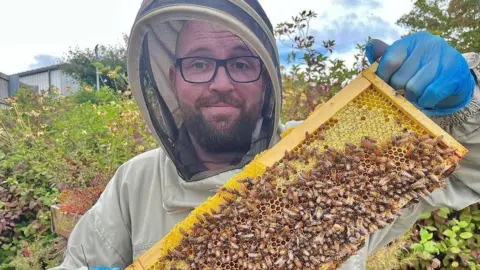 BBC
BBCWhen Ross Main tracked down the abandoned beehives his grandfather had kept in a disused quarry, he was surprised to find that the bees were still there.
The fine art graduate now manages dozens of colonies and millions of bees across Fife – and they are all descended from his grandfather’s hive.
Ross grew up in Dunbar and was often taken to the East Lothian quarry near Innerwick during his childhood.
When he became a father for the first time in 2015, he was inspired to try and find the old hives.
He thought his family had sold them off several years earlier, so did not expect to find much.
Ross, 36, drove from his home in Fife and tracked down the location, hundreds of metres down an old track which was overgrown with gorse.
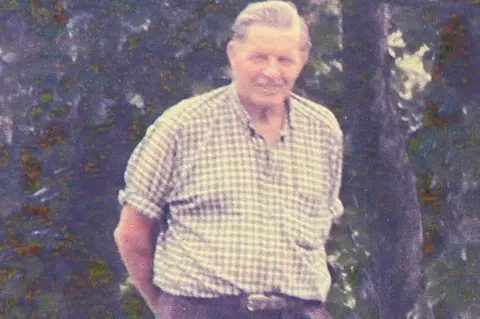 Ross Main
Ross Main"I made my way through and there was still a hive there, " he told BBC Scotland News.
“I couldn't believe the bees had still survived."
The hive had been untouched since his grandfather, William Main, died of cancer in 2007, aged 77.
It was dilapidated, so Ross got hold of a beekeeping suit and a beehive and learned how to transfer the colony to their new home.
Once the transfer was made, which takes about a month, he was able to move the colony in their new hive to a new home in Auchtermuchty, Fife.
The following year his colony started to multiply and just as half of it was swarming he managed to catch it in a second hive.
"They multiply each year. When they get too big they go and start a colony somewhere else," the father-of-two said.
"But the original colony will stay within the hive."
Now he has between 90 and 100 colonies all taken from splits from his late grandfather's hive.
At the height of summer there are about 50,000 bees within one colony.
He has set up a business, Main’s Apiaries, and has five million bees on sites across Fife selling honey to local farm shops from three harvests a year.
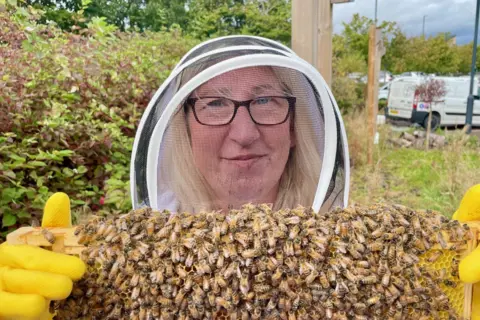
But he said: "You can't really have a business just selling honey because you can have bad years."
So a couple of years ago he started up beekeeping experiences for locals to get an insight into honey production.
And he has sold some of the hives to businesses in Edinburgh and Fife so staff can learn how to become beekeepers.
One of the businesses, disability firm Motability Operations at the Gyle in Edinburgh, now has six hives for their staff.
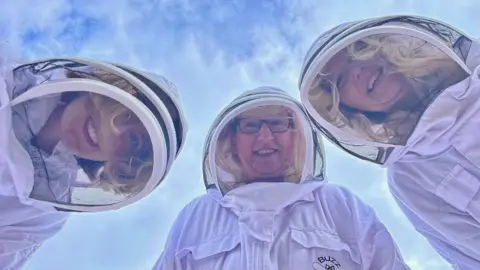
Ross manages their 300,000 bees weekly and teaches them about beekeeping in their lunchbreaks.
Dorota Opara, workplace co-ordinator, said she picked up a fear of bees while growing up in Krakow in Poland.
"When my colleague suggested we have bees on site, I was very cautious and asked if we would have to touch them," she said.
However, she was eventually persuaded to put on a suit to take a look at the hives.
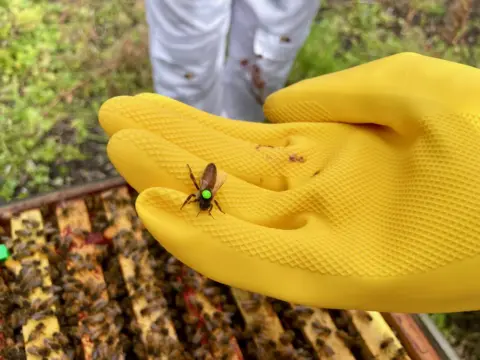
The 42-year-old said: "The funny story is I had a dress on and flip flops. When we were at the beehives I could feel bees going between my toes and I was frightened and I said I don't know if I can do it.
"But Ross told me they are honey bees they will not sting you until you do crazy movement and he was right and since then I'm so in love with the bees.
"Having bees in the garden is one thing but having that kind of connection with Ross who can come and explain to you how everything works is a different experience.
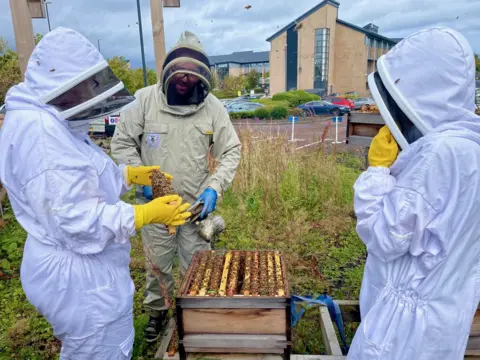
Dorota said: "How many offices can say they have beehives and learn how to become a beekeeper? It's magical."
She now visits the bees every couple of days to check on them.
Ross harvests the honey and gives the jars to the staff.
"The staff absolutely love having the bees," she added.
